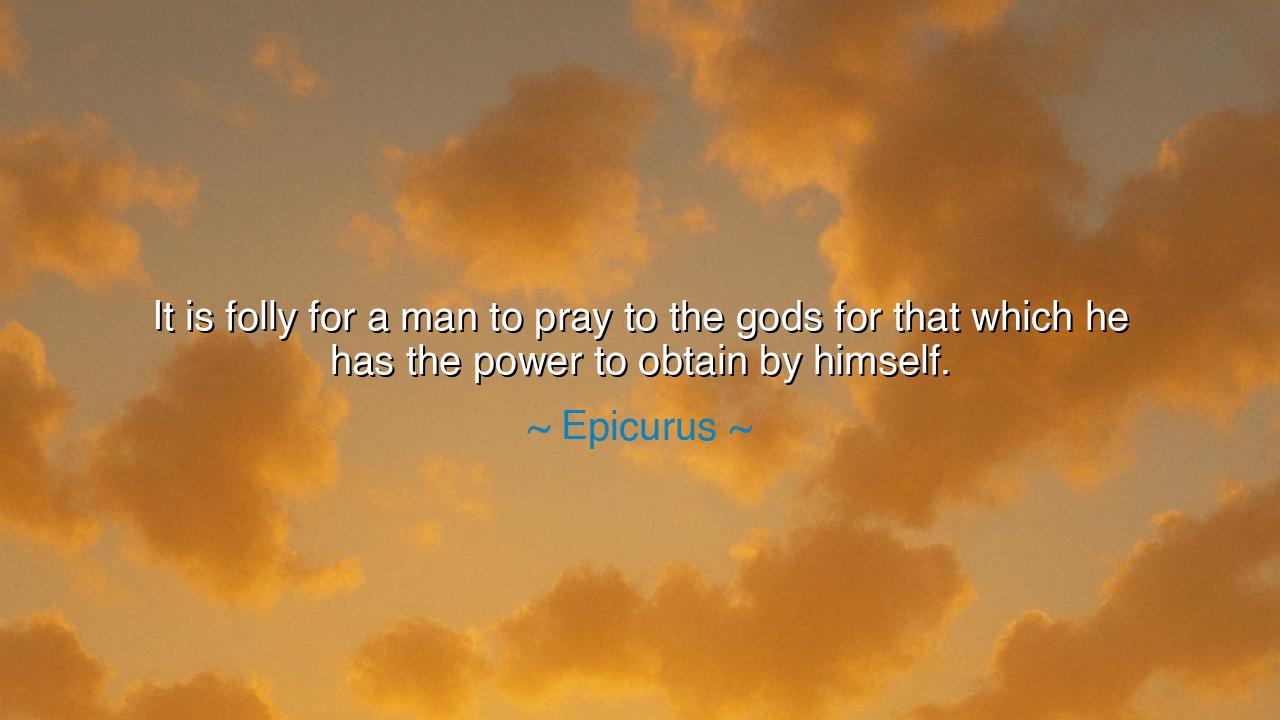
It is folly for a man to pray to the gods for that which he has
It is folly for a man to pray to the gods for that which he has the power to obtain by himself.






The ancient philosopher Epicurus, master of simplicity and seeker of inner peace, once declared: “It is folly for a man to pray to the gods for that which he has the power to obtain by himself.” These words ring with timeless truth, for they call humankind to awaken to its own strength. Too often, mortals look outward to the heavens, begging for blessings that lie already within their reach. Epicurus teaches that true reverence for the divine is not in endless supplication, but in the wise and courageous use of the gifts already bestowed upon us.
To pray is not wrong, for prayer can be an expression of gratitude and connection to the eternal. Yet it becomes folly when a man seeks from the gods what his own hands, mind, and will can create. The farmer who prays for a harvest but neglects to till his field, the warrior who prays for victory but fails to sharpen his sword—these are examples of misguided hope. The gods, Epicurus suggests, have given mortals the tools of reason and action. To ignore these tools while pleading for intervention is to insult both oneself and the divine.
History offers a striking lesson in the story of Alexander the Great. When his army faced a seemingly impassable challenge crossing a perilous river, some urged him to wait for omens and blessings from the gods before advancing. Alexander, however, declared that boldness and strategy were the true offerings the gods desired. By relying on his own power and the strength of his soldiers, he succeeded where others would have hesitated. His deeds embodied Epicurus’s teaching: divine favor often flows through human courage and effort.
In contrast, there are countless tales of rulers and peoples who placed all hope in divine signs while neglecting action. During the final days of Troy, many citizens prayed to the gods to save them from their enemies, even as they welcomed the Greek wooden horse within their gates. Their prayers were fervent, but their lack of discernment led to their downfall. This tragedy shows that while faith may inspire, it must be joined with wisdom and decisive action.
Let this wisdom be passed to all generations: honor the gods not only with words, but with deeds. When you have the power to bring about change, do not wait for miracles to descend from the sky. Act with strength, courage, and clarity, for in doing so, you fulfill the very purpose for which you were created. As Epicurus teaches, the divine has already planted within you the seeds of greatness—your task is to cultivate them, and in so doing, to shape your destiny with your own hands.






THDo Thi Huong
Epicurus raises a valid point about taking responsibility for our own lives, but I wonder if we can sometimes be too self-reliant. Shouldn’t there be space for working with others or tapping into larger forces that we can’t fully control? Is the real message here about not waiting for things to come to us passively but being active and persistent in the pursuit of our goals, while still remaining open to external support?
DKDuyet Khac
I find this quote interesting, but it feels a bit dismissive of faith or hope. While Epicurus is advocating for self-action, what about moments when things feel out of our control? Can asking for divine help be a way of focusing our intentions or gaining perspective, even if we are working hard to achieve something? Does this mean there’s no room for humility in asking for something beyond our own power?
VKvinh khong
I understand the logic behind this quote—why pray for something that you have the power to achieve yourself? But sometimes, prayer can offer comfort and a sense of connection, even when you’re taking action yourself. Does that mean seeking prayer is a sign of weakness, or could it be more of a reflection of hope and intention? I wonder if there’s a middle ground where prayer complements our own efforts, rather than replaces them.
NTNguyen Nhut Thi
Epicurus seems to be emphasizing self-reliance, but I can’t help but think that there are times when we need more than just our own power to accomplish something. If we have the ability to get things done, does that mean we should never seek help from others? Is there a fine line between using our personal power and recognizing when we need support or cooperation from others or even spiritual help?
PQLe Thi Phuong Quynh
This quote makes me think about how often we rely on external factors, like luck or divine help, instead of trusting our own capabilities. Is Epicurus implying that we should take responsibility for our own lives and work toward our goals directly? Or is there a danger in this kind of thinking, where we dismiss the value of seeking guidance or support from others when we have the power to act ourselves?